Upgrade
On this page, you find all documents, package deals, and flashcards offered by seller upgrade.
- 231
- 0
- 19
Community
- Followers
- Following
250 items
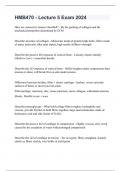
HMB470 - Lecture 5 Exam 2024
How are connective tissues classified? - By the packing of collagen and the mechanical properties determined by ECM Describe structure of collagen - Molecules made of protein triple helix, fibres made of many molecules (like mini ropes), high tensile stiffness+strength Describe the passive LD response of cortical bone - Linearly elastic initially (Hook'es Law) + somewhat ductile Describe the LD response of cortical bone - Stiffer/tougher under compression than tension or shear, will br...
- Package deal
- Exam (elaborations)
- • 4 pages •
How are connective tissues classified? - By the packing of collagen and the mechanical properties determined by ECM Describe structure of collagen - Molecules made of protein triple helix, fibres made of many molecules (like mini ropes), high tensile stiffness+strength Describe the passive LD response of cortical bone - Linearly elastic initially (Hook'es Law) + somewhat ductile Describe the LD response of cortical bone - Stiffer/tougher under compression than tension or shear, will br...

HMB470 Lecture 1study test questions
Define physical activity according to the lecture. How is it measured? - Physical activity is defined as any force exerted by skeletal muscles resulting in energy usage above resting levels. It's measured in volume (amount of energy expended) and intensity (rate of energy expenditure). What are the key components of health mentioned in the lecture? - The key components of health include physical, mental, social, and spiritual well-being. What is the difference between well-being and freed...
- Package deal
- Exam (elaborations)
- • 6 pages •
Define physical activity according to the lecture. How is it measured? - Physical activity is defined as any force exerted by skeletal muscles resulting in energy usage above resting levels. It's measured in volume (amount of energy expended) and intensity (rate of energy expenditure). What are the key components of health mentioned in the lecture? - The key components of health include physical, mental, social, and spiritual well-being. What is the difference between well-being and freed...
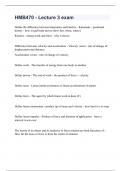
HMB470 - Lecture 3 exam
Define the difference between kinematics and kinetics - Kinematic - positional history - how a rigid body moves (how fast, when, where) Kinetics - energy,work and force - why it moves Difference between velocity and acceleration - Velocity vector - rate of change of displacement and distance Acceleration vector - rate of change of velocity Define work - The transfer of energy from one body to another Define power - The rate of work - the product of force + velocity Define mass - Li...
- Package deal
- Exam (elaborations)
- • 5 pages •
Define the difference between kinematics and kinetics - Kinematic - positional history - how a rigid body moves (how fast, when, where) Kinetics - energy,work and force - why it moves Difference between velocity and acceleration - Velocity vector - rate of change of displacement and distance Acceleration vector - rate of change of velocity Define work - The transfer of energy from one body to another Define power - The rate of work - the product of force + velocity Define mass - Li...
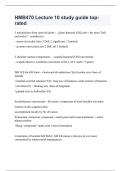
HMB470 Lecture 10 study guide top-rated
3 articulations form synovial joints - - gleno-humeral (GH joint = the main "ball and socket" / enarthrosis) - sterno-clavicular (also 3 DoF, 2 significant, 1 limited) - acromio-clavicular (also 2 DoF, all 3 limited) 2 shoulder motion components - - scapulo-humeral (GHJ movement) - scapulo-thoracic (combines movement of SCJ, ACJ, and C-T spine) ISB JCS for GH Joint - • horizonal ab-adduction (Yp) bi-polar axis -lines of latitude • internal-external rotation (Yd)= long axis of hum...
- Package deal
- Exam (elaborations)
- • 7 pages •
3 articulations form synovial joints - - gleno-humeral (GH joint = the main "ball and socket" / enarthrosis) - sterno-clavicular (also 3 DoF, 2 significant, 1 limited) - acromio-clavicular (also 2 DoF, all 3 limited) 2 shoulder motion components - - scapulo-humeral (GHJ movement) - scapulo-thoracic (combines movement of SCJ, ACJ, and C-T spine) ISB JCS for GH Joint - • horizonal ab-adduction (Yp) bi-polar axis -lines of latitude • internal-external rotation (Yd)= long axis of hum...
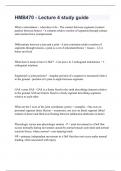
HMB470 - Lecture 4 study guide
What is articulation + what does it do - The contact between segments (contact patches between bones) + it contains relative motion of segments through contact and reaction force (compression) Differentiate between a join and a joint - A join constrains relative motion of segments through tension, a joint is a set of articulated bones + tissues - 2,3,4 bones involved What does it mean to have 6 DoF? - Can move in 3 orthogonal translations + 3 orthogonal rotations Segmental vs joint posi...
- Package deal
- Exam (elaborations)
- • 4 pages •
What is articulation + what does it do - The contact between segments (contact patches between bones) + it contains relative motion of segments through contact and reaction force (compression) Differentiate between a join and a joint - A join constrains relative motion of segments through tension, a joint is a set of articulated bones + tissues - 2,3,4 bones involved What does it mean to have 6 DoF? - Can move in 3 orthogonal translations + 3 orthogonal rotations Segmental vs joint posi...
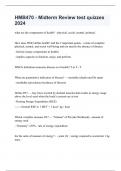
HMB470 - Midterm Review test quizzes 2024
what are the components of health? - physical, social, mental, spiritual, How does WHO define health? and the 2 important points - a state of complete physical, mental, and social well-being and not merely the absence of disease - holistic (many components to health) - implies capacity to function, enjoy, and perform WHO's definition measures disease over health? T or F - T What are quantitative indicators of disease? - - mortality (death rate/life span) - morbidity (prevalence/inc...
- Package deal
- Exam (elaborations)
- • 4 pages •
what are the components of health? - physical, social, mental, spiritual, How does WHO define health? and the 2 important points - a state of complete physical, mental, and social well-being and not merely the absence of disease - holistic (many components to health) - implies capacity to function, enjoy, and perform WHO's definition measures disease over health? T or F - T What are quantitative indicators of disease? - - mortality (death rate/life span) - morbidity (prevalence/inc...
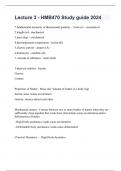
Lecture 3 - HMB470 Study guide 2024
7 fundamental measures of dimensional quantity - (s) -- mechanical h (m) - mechanical (kg) -- mechanical odynamic temperature - kelvin (K) ric current - ampere (A) osity - candela (cd) 7. amount of substance - mole (mol) 3 physical realities - Inertia Gravity Contact Properties of Matter - Mass: the "amount of matter in a body (kg) Inertia: mass resists acceleration Gravity: masses attract each other Mechanical contact - Contact between two or more bodies of matter when th...
- Package deal
- Exam (elaborations)
- • 11 pages •
7 fundamental measures of dimensional quantity - (s) -- mechanical h (m) - mechanical (kg) -- mechanical odynamic temperature - kelvin (K) ric current - ampere (A) osity - candela (cd) 7. amount of substance - mole (mol) 3 physical realities - Inertia Gravity Contact Properties of Matter - Mass: the "amount of matter in a body (kg) Inertia: mass resists acceleration Gravity: masses attract each other Mechanical contact - Contact between two or more bodies of matter when th...
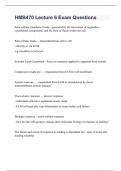
HMB470 Lecture 6 Exam Questions
Intra-cellular (autobaric) loads - generated by the movement of organelles, cytoskeletal components, and the flow of fluids within the cell Para-cellular loads - - transmitted from cell to cell - directly or via ECM e.g. myofibre to tenocyte External Load Generation - forces or moments applied to organism from outside Compressive loads are ... - transmitted from ECM to cell membrane Tensile loads are... - transmitted from ECM to cytoskeleton by direct transmembrane protein linkage...
- Package deal
- Exam (elaborations)
- • 4 pages •
Intra-cellular (autobaric) loads - generated by the movement of organelles, cytoskeletal components, and the flow of fluids within the cell Para-cellular loads - - transmitted from cell to cell - directly or via ECM e.g. myofibre to tenocyte External Load Generation - forces or moments applied to organism from outside Compressive loads are ... - transmitted from ECM to cell membrane Tensile loads are... - transmitted from ECM to cytoskeleton by direct transmembrane protein linkage...
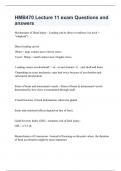
HMB470 Lecture 11 exam Questions and answers
Mechanisms of Head Injury - Loading can be direct or indirect (via neck = "whiplash") Direct loading can be Blunt = large contact area ⇒lower stress Focal / Sharp = small contact area ⇒higher stress Loading causes acceleration(F = m · a) and strain(σ= E · ε)of skull and brain Depending on exact mechanics, may hurt twice because of acceleration and subsequent deceleration Strain of brain and intracranial vessels - Strain of brain & intracranial vessels determined by how ...
- Package deal
- Exam (elaborations)
- • 6 pages •
Mechanisms of Head Injury - Loading can be direct or indirect (via neck = "whiplash") Direct loading can be Blunt = large contact area ⇒lower stress Focal / Sharp = small contact area ⇒higher stress Loading causes acceleration(F = m · a) and strain(σ= E · ε)of skull and brain Depending on exact mechanics, may hurt twice because of acceleration and subsequent deceleration Strain of brain and intracranial vessels - Strain of brain & intracranial vessels determined by how ...
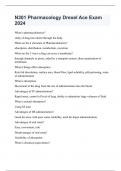
N301 Pharmacology Drexel Ace Exam 2024
What is pharmacokinetics? study of drug movement through the body What are the 4 elements of Pharmacokinetics? absorption, distribution, metabolism, excretion What are the 3 ways a drug can cross a membrane? through channels or pores, aided by a transport system, direct penetration of membrane What 6 things effect absorption Rate kid dissolution, surface area, blood flow, lipid solubility, pH partioning, route of administration What is absorption Movement of the drug from the site of ad...
- Exam (elaborations)
- • 5 pages •
What is pharmacokinetics? study of drug movement through the body What are the 4 elements of Pharmacokinetics? absorption, distribution, metabolism, excretion What are the 3 ways a drug can cross a membrane? through channels or pores, aided by a transport system, direct penetration of membrane What 6 things effect absorption Rate kid dissolution, surface area, blood flow, lipid solubility, pH partioning, route of administration What is absorption Movement of the drug from the site of ad...
